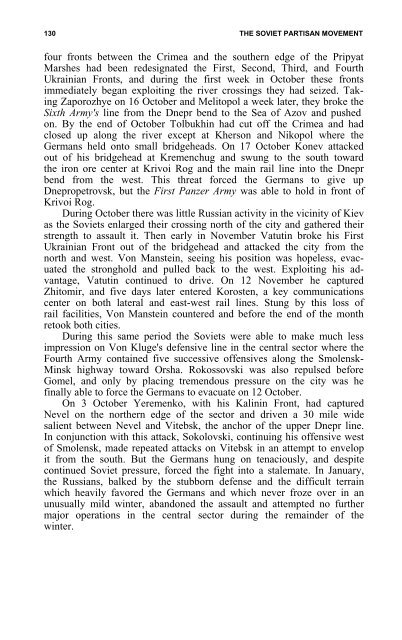the soviet partisan movement 1941-1944 by edgar m. howell
the soviet partisan movement 1941-1944 by edgar m. howell
the soviet partisan movement 1941-1944 by edgar m. howell
You also want an ePaper? Increase the reach of your titles
YUMPU automatically turns print PDFs into web optimized ePapers that Google loves.
130 THE SOVIET PARTISAN MOVEMENT<br />
four fronts between <strong>the</strong> Crimea and <strong>the</strong> sou<strong>the</strong>rn edge of <strong>the</strong> Pripyat<br />
Marshes had been redesignated <strong>the</strong> First, Second, Third, and Fourth<br />
Ukrainian Fronts, and during <strong>the</strong> first week in October <strong>the</strong>se fronts<br />
immediately began exploiting <strong>the</strong> river crossings <strong>the</strong>y had seized. Taking<br />
Zaporozhye on 16 October and Melitopol a week later, <strong>the</strong>y broke <strong>the</strong><br />
Sixth Army's line from <strong>the</strong> Dnepr bend to <strong>the</strong> Sea of Azov and pushed<br />
on. By <strong>the</strong> end of October Tolbukhin had cut off <strong>the</strong> Crimea and had<br />
closed up along <strong>the</strong> river except at Kherson and Nikopol where <strong>the</strong><br />
Germans held onto small bridgeheads. On 17 October Konev attacked<br />
out of his bridgehead at Kremenchug and swung to <strong>the</strong> south toward<br />
<strong>the</strong> iron ore center at Krivoi Rog and <strong>the</strong> main rail line into <strong>the</strong> Dnepr<br />
bend from <strong>the</strong> west. This threat forced <strong>the</strong> Germans to give up<br />
Dnepropetrovsk, but <strong>the</strong> First Panzer Army was able to hold in front of<br />
Krivoi Rog.<br />
During October <strong>the</strong>re was little Russian activity in <strong>the</strong> vicinity of Kiev<br />
as <strong>the</strong> Soviets enlarged <strong>the</strong>ir crossing north of <strong>the</strong> city and ga<strong>the</strong>red <strong>the</strong>ir<br />
strength to assault it. Then early in November Vatutin broke his First<br />
Ukrainian Front out of <strong>the</strong> bridgehead and attacked <strong>the</strong> city from <strong>the</strong><br />
north and west. Von Manstein, seeing his position was hopeless, evacuated<br />
<strong>the</strong> stronghold and pulled back to <strong>the</strong> west. Exploiting his advantage,<br />
Vatutin continued to drive. On 12 November he captured<br />
Zhitomir, and five days later entered Korosten, a key communications<br />
center on both lateral and east-west rail lines. Stung <strong>by</strong> this loss of<br />
rail facilities, Von Manstein countered and before <strong>the</strong> end of <strong>the</strong> month<br />
retook both cities.<br />
During this same period <strong>the</strong> Soviets were able to make much less<br />
impression on Von Kluge's defensive line in <strong>the</strong> central sector where <strong>the</strong><br />
Fourth Army contained five successive offensives along <strong>the</strong> Smolensk-<br />
Minsk highway toward Orsha. Rokossovski was also repulsed before<br />
Gomel, and only <strong>by</strong> placing tremendous pressure on <strong>the</strong> city was he<br />
finally able to force <strong>the</strong> Germans to evacuate on 12 October.<br />
On 3 October Yeremenko, with his Kalinin Front, had captured<br />
Nevel on <strong>the</strong> nor<strong>the</strong>rn edge of <strong>the</strong> sector and driven a 30 mile wide<br />
salient between Nevel and Vitebsk, <strong>the</strong> anchor of <strong>the</strong> upper Dnepr line.<br />
In conjunction with this attack, Sokolovski, continuing his offensive west<br />
of Smolensk, made repeated attacks on Vitebsk in an attempt to envelop<br />
it from <strong>the</strong> south. But <strong>the</strong> Germans hung on tenaciously, and despite<br />
continued Soviet pressure, forced <strong>the</strong> fight into a stalemate. In January,<br />
<strong>the</strong> Russians, balked <strong>by</strong> <strong>the</strong> stubborn defense and <strong>the</strong> difficult terrain<br />
which heavily favored <strong>the</strong> Germans and which never froze over in an<br />
unusually mild winter, abandoned <strong>the</strong> assault and attempted no fur<strong>the</strong>r<br />
major operations in <strong>the</strong> central sector during <strong>the</strong> remainder of <strong>the</strong><br />
winter.
















